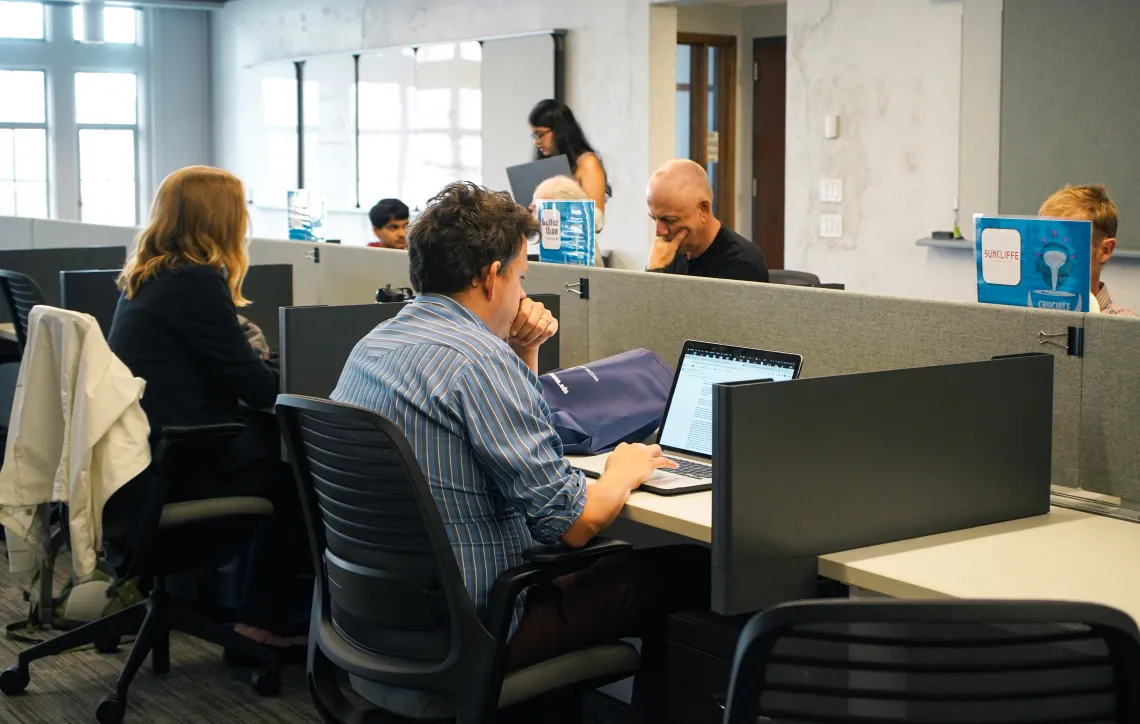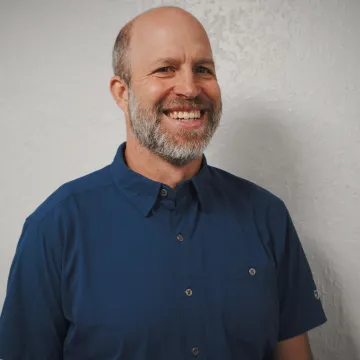Q & A With Crucible Mentor in Residence Brian Ellison

We asked FORGE Lead Mentor in Residence Brian Ellison to tell us about Crucible and the upcoming F23 Crucible Demo Day event. Those who are interested in reserving tickets for event can register here.

Brian Ellison headed up programming and training for the new FORGE Crucible accelerator, where he worked hand in hand with four startup companies: Better Than Provisions, Marro Technologies, Suncliffe Gin, and Wander Health.
Ellison founded the consulting group Preston-Douglas, helping companies solve problems and move toward commercialization and operations success. That company spans sectors from medical devices and scientific exploration to non-profit management and consumer-packaged goods. Prior to Preston-Douglas, Ellison worked in advanced manufacturing for Midwest Prototyping. He led the expansion of BadgerShield to produce over 50 million protective face shields globally during the pandemic. With roots in the land from growing up on a Midwest farm, Ellison continually finds ways to connect ideas to places. In 2006, he began working with rural families in Wisconsin to grow wheat for use in high-end consumer products. That grew to become Death's Door Spirits, one of the spirits industry's largest and most successful early-stage craft brands.
Ellison holds an undergraduate degree from the University of Georgia and a Master of Business Administration from IESE-University of Navarra in Barcelona, a top-ranked program globally. As part of the Crucible program, Ellison is helping entrepreneurs focus their efforts, hone their craft, and grow their business ideas.
Q: What can attendees expect to see at the Demo Day event?
The Demo Day event is the culmination of 8 weeks of work into a 10-minute presentation. That's challenging, but these companies must hone their pitch presentations, highlight their achievements, and acknowledge where they need help to reach the next level.
That "Ask," as we call it, is different for each company. Some may seek strategic partnerships or specific introductions, while others seek key hires or immediate funding. Others are still focused on identifying investors to help build their teams and scale their companies quickly to capture immediate success. The Crucible companies span from consumer-packaged goods to software as a service to an international medical concierge to a beautiful gin. You never know who will be in the audience with a critical connection or an opportunity to collaborate with these rising companies. We are excited to bring these companies forward. Audience members at Demo Day can say they knew them "back when" or potentially step up and be a part of their future!
Q: What inspired creating the Crucible accelerator and its goals for supporting startups?
Crucible is a public-private collaboration to scale promising businesses in Pima County. We saw the necessity for servicing startups at the edge of investment readiness with unique needs to reach the next level. Central to the program is utilizing resources in Tucson- from accounting and legal support to private equity and angel investment. One goal was for companies to see that the ecosystem in the Tucson region is uniquely positioned to help them thrive.
Crucible's Key Performance Indicators (KPIs) were straightforward- have companies "level up" in investment readiness, increase sales opportunities, and demonstrate a scalable growth strategy.
Q: How were the participating companies selected, and what criteria were used in the selection process?
The "Investment Readiness Index" framework from Abaca was at the core of the selection criteria. As applicants answered questions regarding their business, they were given a clear assessment of where their company stands. That helped us understand their challenges and accomplishments and assess if they were ready for the program.
Q: What kind of support and resources did the participating companies receive during the eight-week program?
All our companies had full-time dedicated founders and were generating revenue, so there had to be no significant distractions. Crucible forced founders to take a break from working "in" the business so that they could focus "on" the business. We garnered sponsorship from local private and public entities. That funded stipends for each company throughout the 8-week program that defrayed costs, helped offset the absence from the day-to-day business, and allowed for complete focus on the Crucible program.
Participants focused on three distinct areas: skill building, corporate hygiene, and strategic vision. Crucible had over 30 top-notch speakers on these topics over the 8-week program, ranging from "101 of bookkeeping and accounting" and "Negotiations and alternate dispute resolution" to "When is the right time to hire my replacement?" and "The 'Ask': what you're asking for when you fundraise and why?" Participants worked on these areas with FORGE Mentors-In-Residence, advisors from the local investment community, professional service providers, and FORGE Founding Executive Director Brian Ellerman.
The cohort also worked in mandatory work sessions in The Hub at Roy Place -building their growth pipelines, holding conversations with potential customers and partners, and meeting interested parties for growth, collaboration, and investment.
Q: Can you share some of the startups' success stories or notable achievements during their participation in Crucible?
Each company in the cohort has made achievements, and I am proud of everyone.
Marro Technologies better refined the explanation of their technology and their growth strategy in their pitch. They have started to apply those strategies to scale their team up quickly to meet growing demand.
Better Than Provisions recognized that the company's value goes beyond its current products into its unique production process. They built a scope of duties for their founders and identified potential key hires that allow them to operate more efficiently as they expand their business.
Wander Health refined its go-to-market strategy to be more straightforward to potential customers and investors. They have built a growth strategy that allows them to focus on key markets without fear of spreading themselves too thin.
Suncliffe Gin established vital growth metrics and knows where they want to take their company and where they don't. They have refined their pitch and present a compelling and exciting story as to their future.
Q: What message would you like to convey to other entrepreneurs considering participating in similar accelerator programs?
I am humbled and honored when startups are willing to open their businesses and ask for help. It requires a high level of trust and a willingness to show vulnerability- everyone has something to learn, and no one knows everything they need to succeed. Successful entrepreneurs understand that programs like Crucible are only as good as the work they are willing to put into it. We can put together excellent speakers, set up top-notch pitch sessions, and provide a fantastic working environment, but it only succeeds when they are willing to do the work. Seeing our cohort present, excited, and engaged every week of this program has been amazing- especially when some topics have been tough.
That resilience and openness allowed for the success of this program, and I am so proud of every founder in this cohort.

